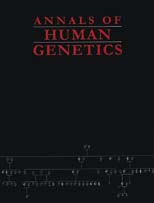Article contents
Evidence for a major gene accounting for mild elevation in LDL cholesterol: The NHLBI Family Heart Study
Published online by Cambridge University Press: 01 September 1999
Abstract
Studies of rare Mendelian disorders of low density lipoprotein cholesterol (LDL-C) metabolism have identified specific genetic mutations in the LDL receptor and apolipoprotein B. Although these rare mutations account for a small proportion of LDL-C variation, twin and adoption studies indicate that at least 50% of the overall LDL-C observed variation is genetically determined. In a heterogeneous sample of 3227 subjects from the NHLBI Family Heart Study collected from four US centres, we find evidence for a common major gene accounting for mild elevations (1.25 standard deviations) in LDL-C. The analysis favored a recessive model with a frequency of 0.52 for the gene influencing elevated LDL-C, phenotypic means of 113 mg/dl for the normal genotypes and 146 mg/dl for the abnormal genotype, and a significant polygenic heritability. This statistically-inferred major gene accounted for 24% of the variation in LDL-C, with polygenes accounting for another 28% of the variation. Using parameters for major gene transmission estimated in the segregation analysis, LDL-C showed no linkage to the LDL receptor gene (LDLR), nor to the apolipoprotein E gene (APOE), nor to the cholesterol 7α-hydroxylase gene (CYP7A1), indicating the major gene effect influencing mild elevation in LDL-C is not explained by any of these candidate loci.
- Type
- Research Article
- Information
- Copyright
- © University College London 1999
- 10
- Cited by




